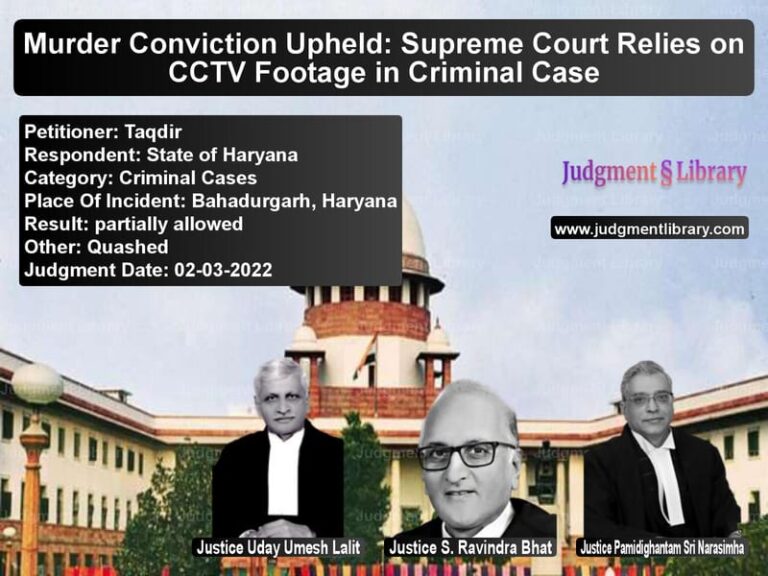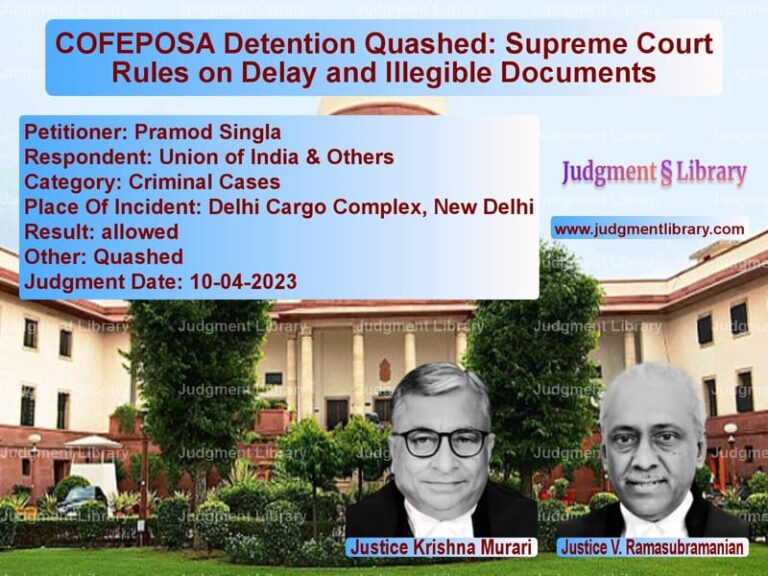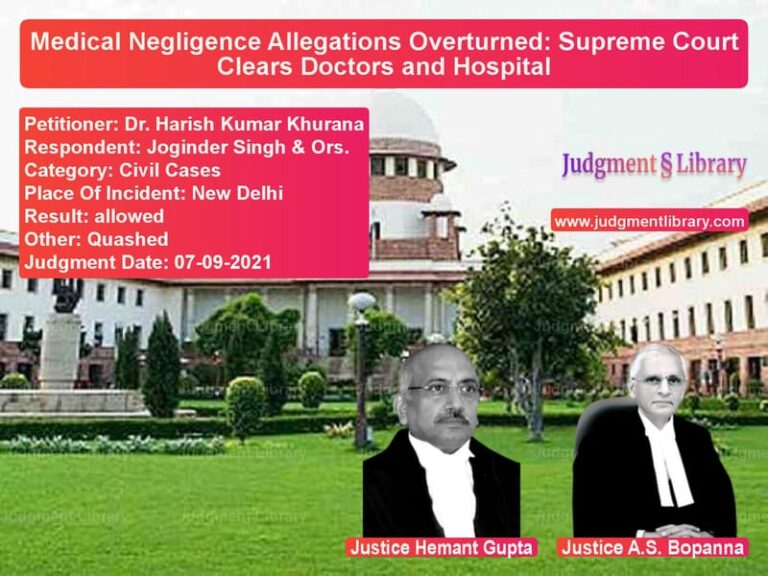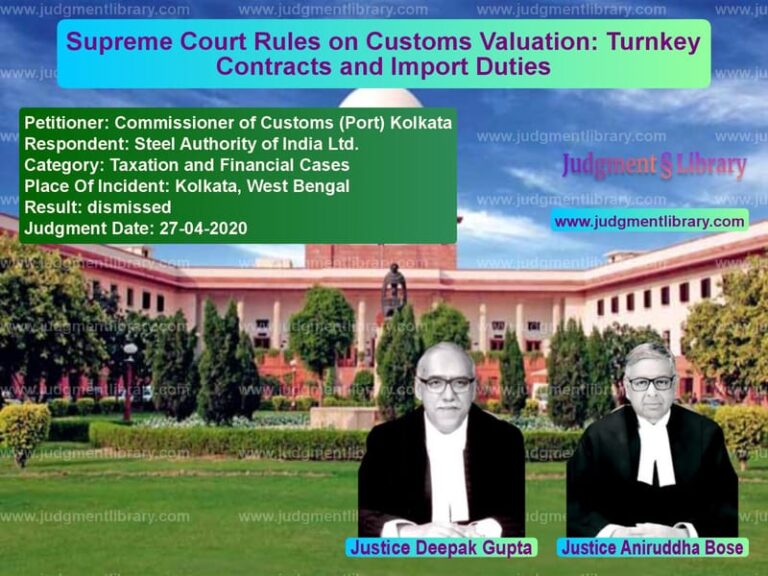Supreme Court Upholds Government’s Ownership in Land Dispute: A Detailed Analysis
The Supreme Court recently delivered a landmark judgment in the case of Union of India & Anr vs. S. Narasimhulu Naidu (Dead) Through LRs. and Others, which revolved around a complex land ownership dispute in Hyderabad. The case was originally filed under the Andhra Pradesh Land Grabbing (Prohibition) Act, 1982, raising significant legal questions about the possession and ownership of government land.
The central issue was whether the land in question was lawfully transferred to the government or if it was being wrongfully occupied, leading to allegations of land grabbing. The case reached the Supreme Court after an appeal against the decisions of the Special Court and the High Court, which had ruled in favor of the private claimants.
Background of the Case
The dispute concerns 7128.5 square yards of land in Survey No. 299/2, Hyderabad. The respondents claimed ownership based on inheritance, while the government asserted that the land had been transferred to the Ministry of Defence in 1958.
Key events leading to the Supreme Court appeal:
- The land was originally owned by Shaik Ahmed, from whom S.V. Srinivasulu Naidu purchased it in 1959.
- The respondents, being legal heirs of Naidu, claimed that their father had lawfully acquired the property and had never sold it to the government.
- The Union of India contended that the Andhra Pradesh government had transferred the land to the Ministry of Defence in 1958.
- The Special Court ruled in favor of the respondents, declaring the government a land grabber and directing it to vacate the land.
- The Union of India appealed to the High Court, which upheld the Special Court’s decision.
- The matter was then brought before the Supreme Court.
Arguments Presented Before the Supreme Court
Petitioner’s Arguments (Union of India)
- The government’s legal team argued that the land had been lawfully transferred to the Ministry of Defence by the Andhra Pradesh government.
- They submitted historical land records and official documents proving uninterrupted possession by the government since 1958.
- The General Land Register and Military Land Register contained entries confirming government ownership.
- The respondents had failed to provide any registered sale deed or document proving that the land was still privately owned.
- They contended that the earlier suit (O.S. No. 175 of 1970) was relevant only to a portion of the land and did not conclusively establish ownership over the entire 7128.5 square yards.
- The Special Court had wrongly applied the Andhra Pradesh Land Grabbing (Prohibition) Act to the government, as the government could not be considered a land grabber.
Respondents’ Arguments
- The respondents argued that the land was private property and was never transferred to the government.
- They relied on the judgment in O.S. No. 175 of 1970, claiming it established their ownership.
- They pointed out that their father had acquired the land through legally registered sale deeds in 1959 and had maintained possession for decades.
- The government’s reliance on military records was misplaced, as mere possession did not amount to lawful ownership.
- They argued that any transfer of private land to the government must be registered under the Registration Act, 1908.
Supreme Court’s Observations
The Supreme Court carefully analyzed the evidence and legal principles before reaching its conclusion.
1. Government Ownership and Long-Term Possession
The Court observed that the Union of India had maintained uninterrupted possession of the land for over 60 years.
“When the government has continuously possessed land under official records for decades, the burden of proving private ownership rests on the claimant.”
2. The Legality of the 1958 Transfer
The Court upheld the validity of the land transfer by the Andhra Pradesh government to the Ministry of Defence.
“Under the Government Grants Act, 1895, the transfer of government land does not require registration under the Registration Act, 1908.”
3. Inapplicability of the Land Grabbing Act
The Court ruled that the Andhra Pradesh Land Grabbing (Prohibition) Act was inapplicable to the government.
“The government, being the lawful owner, cannot be categorized as a land grabber under the Act.”
4. The Respondents’ Failure to Prove Ownership
The Court noted that the respondents failed to produce any registered title document proving ownership over the entire disputed land.
“Mere reliance on an old civil suit judgment, which covered only part of the land, is insufficient to claim ownership over the entire property.”
Final Judgment
The Supreme Court allowed the appeal and issued the following directives:
- The Special Court’s and High Court’s orders were set aside.
- The Union of India was declared the lawful owner of the disputed land.
- The respondents’ claims were dismissed due to a lack of documentary evidence.
- The government was directed to ensure the land remained under official possession.
The Court concluded:
“Long-standing government possession, coupled with valid historical transfers, cannot be disregarded based on unsubstantiated private claims.”
Implications of the Judgment
This ruling has significant implications for land disputes involving government properties:
- Reaffirmation of Government Ownership: The ruling strengthens government rights over lands acquired through official transfers.
- Burden of Proof on Claimants: Individuals contesting government land ownership must present strong documentary evidence.
- Limited Application of Land Grabbing Laws: The judgment clarifies that such laws cannot be misused against the government.
- Judicial Review of Land Records: The case emphasizes the importance of official land records in adjudicating ownership disputes.
Overall, this judgment reinforces the principle that historical land transfers to the government, even if disputed later, must be backed by strong evidence before courts consider reversing ownership.
Petitioner Name: Union of India & Anr.Respondent Name: S. Narasimhulu Naidu (Dead) Through LRs. and Others.Judgment By: Justice Sanjay Kishan Kaul, Justice Hemant Gupta.Place Of Incident: Hyderabad.Judgment Date: 27-08-2021.
Don’t miss out on the full details! Download the complete judgment in PDF format below and gain valuable insights instantly!
Download Judgment: union-of-india-&-anr-vs-s.-narasimhulu-naidu-supreme-court-of-india-judgment-dated-27-08-2021.pdf
Directly Download Judgment: Directly download this Judgment
See all petitions in Property Disputes
See all petitions in Landlord-Tenant Disputes
See all petitions in Specific Performance
See all petitions in Damages and Compensation
See all petitions in Judgment by Sanjay Kishan Kaul
See all petitions in Judgment by Hemant Gupta
See all petitions in allowed
See all petitions in supreme court of India judgments August 2021
See all petitions in 2021 judgments
See all posts in Civil Cases Category
See all allowed petitions in Civil Cases Category
See all Dismissed petitions in Civil Cases Category
See all partially allowed petitions in Civil Cases Category







